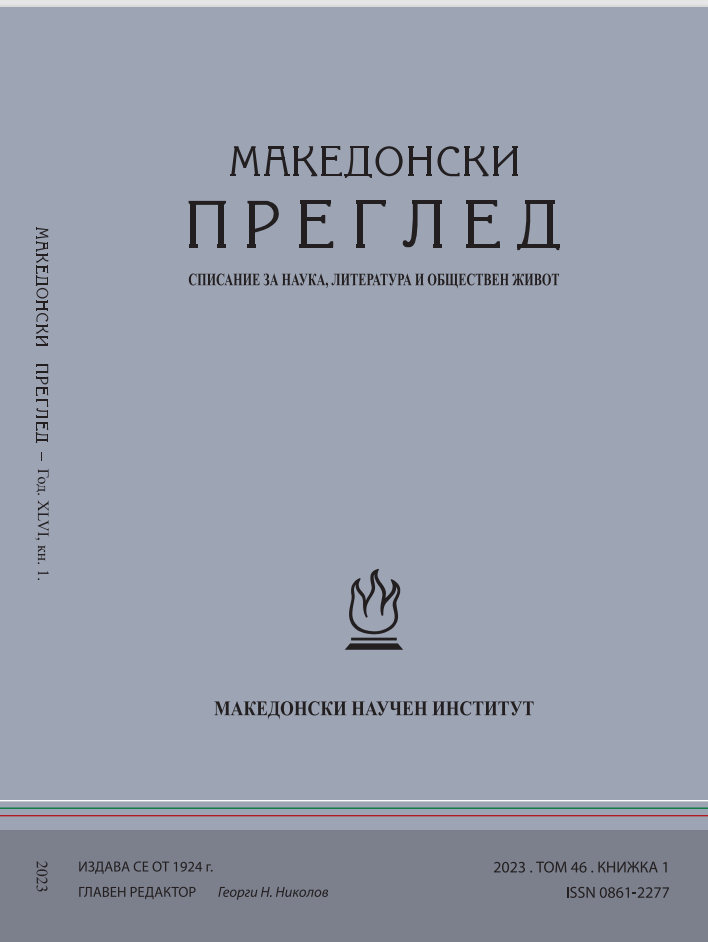
We kindly inform you that, as long as the subject affiliation of our 300.000+ articles is in progress, you might get unsufficient or no results on your third level or second level search. In this case, please broaden your search criteria.

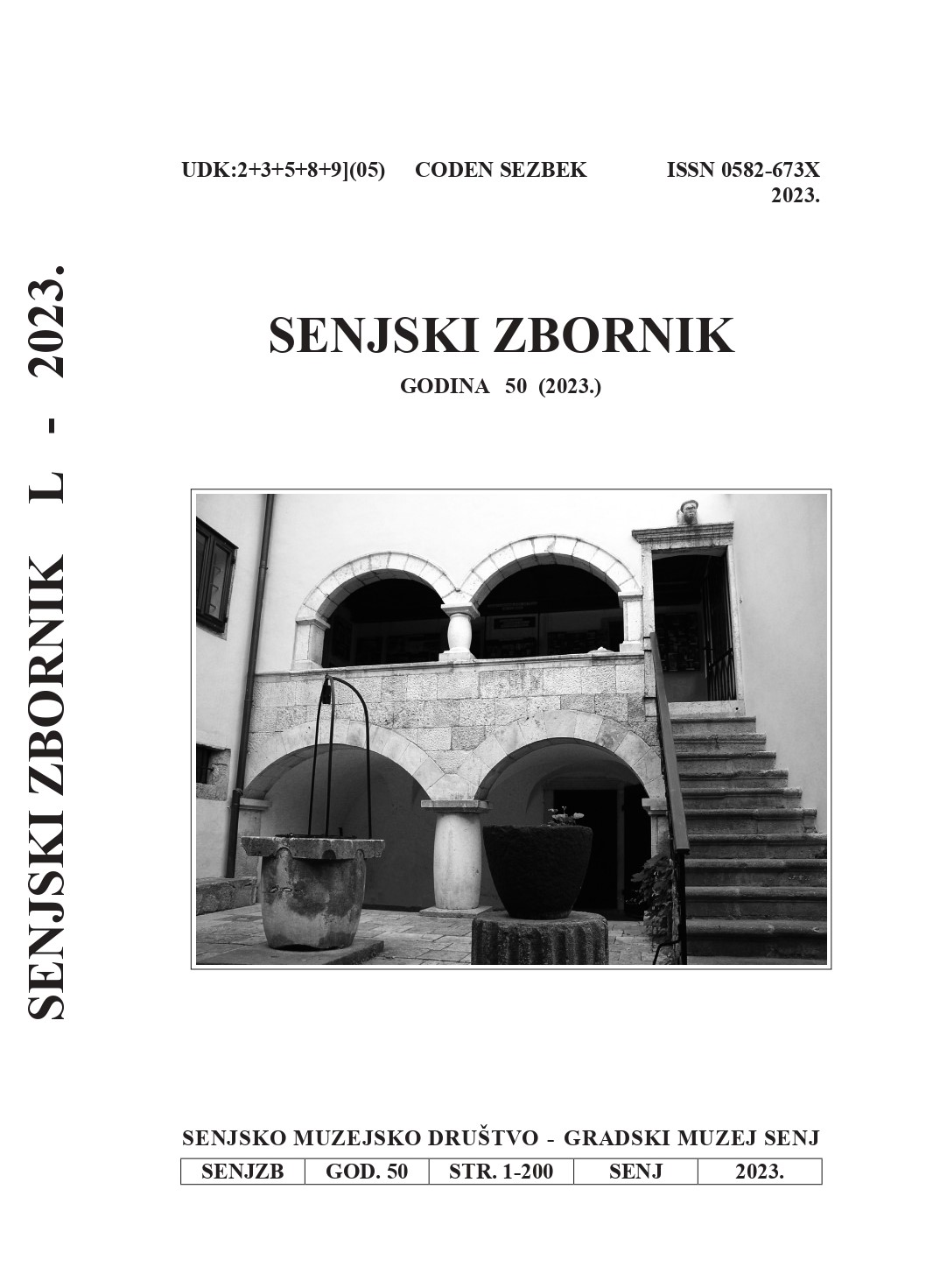
In this paper, the author examines the actions and involvement of Vatroslav Cihlar, who was a student at the Nautical School in Bakar during the student strike in 1912. The paper especially wants to look at his role in the struggle against the politics of the ban of the time Slavko Cuvaj. The student strike is placed in a historical context, and the events related to those events at the local level, its course and the consequences felt by the participants, the students, and therein Vatroslav Cihlar until it finished, are analysed with an insight at preserved archival and periodical materials.
More...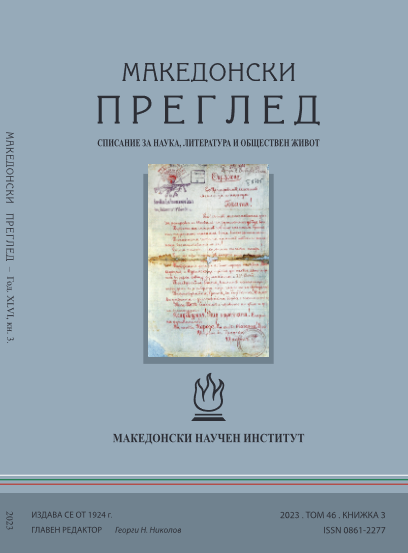
The Ilinden-Preobrazhenie Uprising of 1903 was an uprising of the Macedonian and Thracian Bulgarians in the European vilayets of the Ottoman Empire, supported by the free Bulgarians living in the Principality of Bulgaria. This fact, which is the shortest possible definition of the uprising, has been simultaneously and universally recognized– first of all, by the Ottoman authorities themselves, and together with them – by the jealous and hostile to the Bulgarian national cause Balkan neighbours, as well as by ‘big’ and ‘small’ countries, by international observers of different origins. The questioning of the Bulgarian character of the uprising started to gain momentum much later, with the blurring power of politics and geopolitics which intervened to create misconceptions. This way they turned over time until today into an artificially maintained problem in interstate relations. The Bulgarian Ilinden of 1903 and the revolutionary struggle in Macedonia and Adrianople Thrace in general prepared the Balkan War of 1912. The Macedonian-Adrianople liberation movement provided the Bulgarian national state with the historic chance to solve the all-Bulgarian question inherited from the Revival period: a task with which, unfortunately, the Bulgarian political elite failed to cope.
More...
In the spring of 1876, during the April Uprising against the Ottoman Empire, the Bulgarians used homemade wooden artillery: the so-called cherry cannons. Its real effect was insignificant, but it had a certain moral impact: it raised the fighting spirit of the insurgents. Nearly thirty years later – during the Ilinden Preobrazhenie Uprising – the Bulgarians again used the same type of cannons. If in 1876 wooden cannons were an extremely outdated technology that was almost without analogue, at least in Europe, then at the beginning of the 20thcentury their manufacture and attempts to use them appeared to be an absolute, hard-to-explain anachronism. The main explanation for the use of this ‘artillery’ by Ilinden-insurgents was the fact that they were inspired by the same ideals, by the same urge for freedom, as their oppressed countrymen of nearly three decades ago.
More...
Among the newspapers that shaped the level of knowledge of Poles in Galicia, the daily Czas newspaper played an important role. This also concerned the Ilinden-Preobrazhenie Uprising, to which the paper devoted much attention, informing its readers objectively and extensively about the events taking place in the Balkans. The article deals with the journalistic coverage of the Ilinden-Preobrazhenie Uprising and the preparations therefor, as provided by the Polish Cracow-based daily newspaper Czas in 1903, placed on the background of the intricate geopolitical developments of that time. The articles meticulously refers to all the publications made by Czas on these issues.
More...
The situation of the three Macedonian vilayets has been traced conscientiously by Austro-Hungarian authorities at the turn of the century according to the consular reports of the HHStA and the series of reports published in Diplomatische Aktenstücke in 1906. These included observations on schooling, ethnic and religious situations prior to the outbreak of the Ilinden revolt. These documents testify that Austria-Hungary wanted to exploit the growing unrest for its own political purposes by initiating a reform plan that would give the right for Vienna to interfere into the internal affairs of Ottoman Turkey, maintaining its integrity under the aegis of a humanitarian intervention together with Russia. This is highlighted by the fact that several versions of ethnic maps and conscription of schools did exist at the turn of the century in the Austrian consular agencies with often contradictory or manipulated contents, depending on the actual political relations towards the Ottomans and Bulgaria. The worsening economic situation in Macedonia was also detected by the local Austro-Hungarian authorities,and this, together with the increasing observations on political and “everyday” violence and migration gave a good pretext to intervene together with Russia, as the Ottoman reform plans in 1902 were considered unsatisfactory both by the Powers and the Bulgarians. Knowing the Austro-Russian endeavour to intervene, and considering the plans of the Powers unsatisfactory, the IMARO acted prematurely fearing of a modest agreement between Ottomans and the Powers over Macedonia.
More...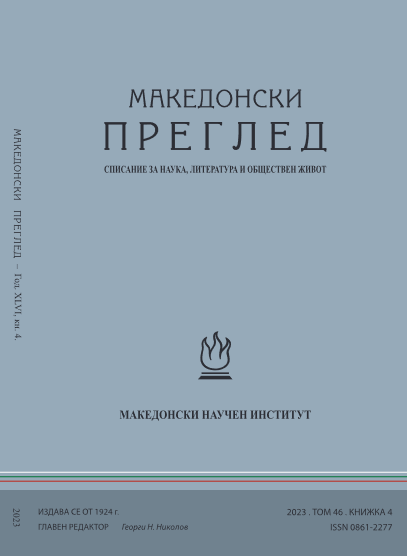
The Archiv of the Bulgarian Academy of Sciences contains several notebooks and a typewritten text in which the famous Bulgarian scholar, Prof. Yordan Ivanov, described his impressions of his first trip to Macedonia, when he was collecting materials for his future book Bulgarian Antiquities around Macedonia. These notes have not been published until now. They obviously served Y. Ivanov in the preparation of his monograph, but at the same time they differ from its scientific style. The notes also contain factual material, but it is secondary to the personal impressions of the author’s encounters with ordinary people, to his reflections on the political situation in the Ottoman Empire after the Ilinden-Preobrazhenie Uprising of 1903, to poetic descriptions of nature landmarks, etc. The said manuscript materials from the archive constitute a special kind of scholarly travelogue, an artistic description of unknown but also familiar lands. In 1906, the Bulgarian scholar visited the ‘unknown’ Macedonia for the first time; but she was at the same time ‘familiar’: known from stories about the family history of Y. Ivanov, whose roots were from the Kratovo district. Attached to the article is the transcript of the first notebook, describing Prof. Y. Ivanov’s impressions from his trip from Vrancha to Thessalonica and Athos in October 1906 – January 1907.
More...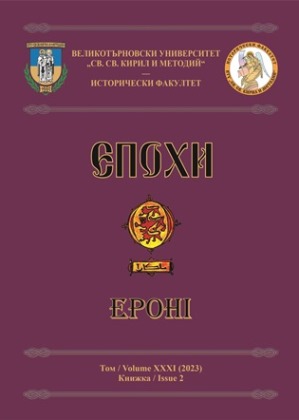
The recognition of electoral rights and the participation of women in political life did not generate a fair representation of them in elected political positions. Beyond discussions or polemics, the need for women’s involvement in politics cannot be ignored, and representation must manifest itself as the basic principle upon which any genuine democracy develops. Through this study, we propose an analysis of women’s participation in political life from the perspective of the reality that Romanian society has faced since the first manifestations of emancipation and winning electoral rights for women until now, when they are still underrepresented in elected political offices.
More...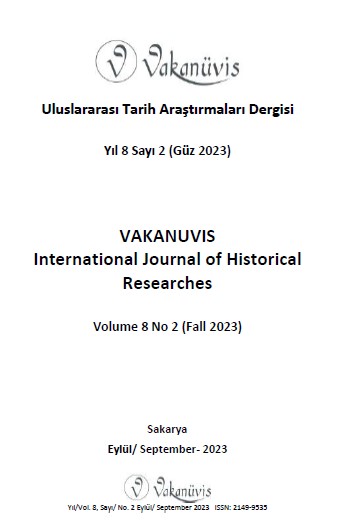
The issue of migration and migrants has been institutionalized since the Ottoman Empire. The Ottoman Empire established commercial, political, economic and social interaction and communication not only with Muslims but also with non-Muslims, both through the people living in the Ottoman lands and the people living in the border countries and has introduced various regulations on these over the decades. At the end of the First World War and during the construction process of Republican Turkey, policy about migration and migrants was brought to the agenda during the Lausanne Conference yet. The delegation participating in the conference held discussions on this issue in Lausanne. In these negotiations, there are also Swiss officials, who were not actually involved in the conference. Discussions about the Swiss, who are represented since the Ottoman Era in smaller numbers than citizens of other European countries, has started during this conference, and the subsequent process was determined by the foreign policy principles of the Ankara government after Lausanne. Switzerland appears to have adopted at a later stage the new process that includes the recognition of Ankara as the capital, the new government's full independence in the international arena and that is based on the understanding of fundamental and official treaty texts than Germany and Austria. Trade and Residence agreements for Turkish citizens going to Switzerland or Swiss citizens coming from Switzerland lasted for a long time because of this reason but signed on its reciprocity merits between the two countries ultimately.
More...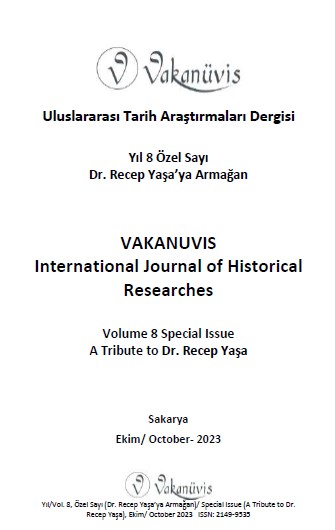
Born in 1865 in Antalya, Sururizâde Ali Nazif Sururi was a bureaucrat who received a decent education, specialized in law and literature, and authored numerous works. He started his civil service career in the Vice Secretarial of the Royal Court after completing his internship, and in 1901 he was appointed as a member of the Council of State, which would bring him bureaucratic fame. However, he was excluded from the Council during the Second Constitutional Era due to his work as a sleuth and his loyalty to Abdülhamid II and was even exiled in later years on the grounds that he was an opponent of the Constitutional Monarchy. During the Armistice period, he was among the founding members of the Assocciation of the Friends of England in Turkey. Despite having such a past, in the following years, since he published works that supported the values advocated by the Republican administration, nothing was against him after the proclamation of the Republic; on the contrary, they tried to benefit from his state experience. Accordingly, in this study, the life and intellectual world of Sururizâde Ali Nazif Sururi, whose life story is full of controversy, is analyzed within the atmosphere of the era.
More...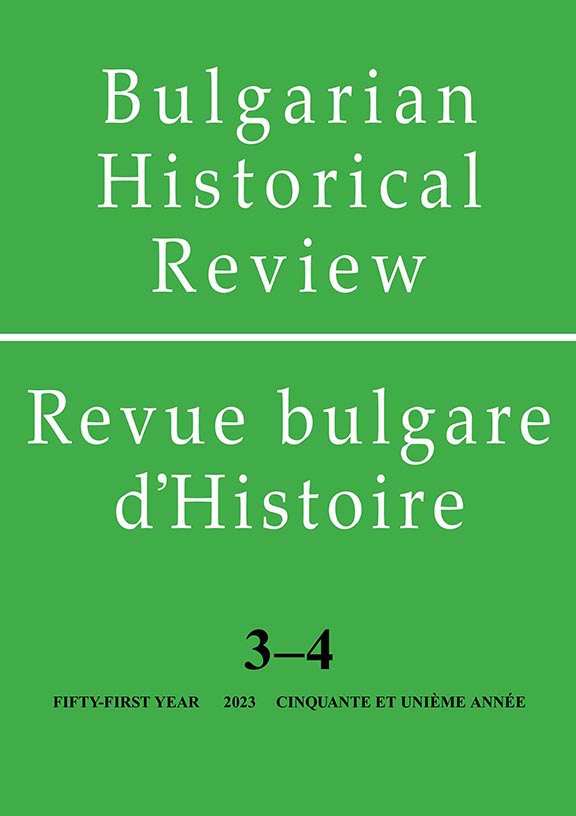
This paper deals with Montenegrin-Bulgarian relations before the First Balkan War that Montenegro and Bulgaria waged against Turkey together with their allies Serbia and Greece. Montenegrin-Bulgarian relations went from 1878 to 1912, mainly became better and better. These two states had no territorial or global conceptual conflicts of interest. Both were aware that they would have to go to war with Turkey to liberate the Balkans from five centuries of Ottoman occupation. This concept had an emotional character. Unlike the relations between the two countries, both were Slavic, so it was insisted on that detail, which was promoted by the mutual protector and ally Russia. The unfolding of events at the end of the First Balkan War, and immediately after it, as well as the fact that Montenegro was ethnically closer to Serbia than Bulgaria, committed it to go to war against Bulgaria in 1913, although Montenegro did not benefit from that war.
More...
The paper explores how the international policy addressed the Albanian question during the Balkan Wars of 1912–1913. The paper sheds light on the dynamics of relations between the Powers just before the onset of the World War I and points to the course a small country’s ambitions were dealt with under the European Concert, the last stand of whose was the Scutari crisis of 1912/13. It discusses one of the major debates during the Balkan Wars, the fate of Scutari. In order to present the impact of the European Powers’ diplomacy and its modus operandi, the article brings in light the unpublished British historical records from the Public Record Office, published diplomatic documents, the contemporary press that covered these events and relevant books and articles on the matter. The article proves that, despite being part of different alliances, the Great Powers were not eager to clash in regard to interests of a small Balkan country, and that all military efforts of Montenegro were, from the very beginning, futile and diplomatically groundless.
More...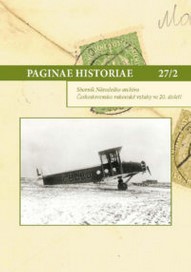
Review of: Sonja Anžič: Péče o chudé v Kraňsku. Sociální politika v Kraňsku od poloviny 18. století do roku 1918; Srbská pravoslavná církev ve Slovinsku v meziválečném období; Podoba lublaňských hostinců na přelomu 19.–20. století; Kazenski proces proti Črtomiru Nagodetu in soobtoženim. Epilog. Ljubljana 2017.; Vodnik po arhivskem gradivu k I. svetovne vojne 1. del
More...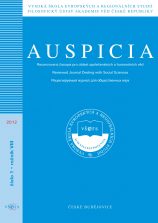
The article deals with a specific topic of Czechoslovak women’s movement in the Dual Monarchy and early Czechoslovakia in the second half of the 19th century and the beginning of the 20th century. It introduces the social and political situation of that time in connection to Czech women, the activities of Czechoslovak women in political, public, social and educational area. The core of the article is the personality and actions of Thomas and Charlotte Garrigue Masaryk, two exceptional people who helped widely to support the Czechoslovak women’s movement. Their relationship, way of life, character and morals are presented as the unique way of fighting against gender inequality in society.
More...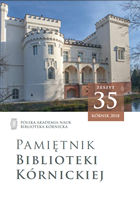
The collections of the Kórnik Library include an aldermen’s register of Zbąszyń, which was kept between 1588 and 1914. For centuries, it was the most important book documenting the town’s life. The articles contains a detailed analysis of records entered in the volume. The text is accompanied by an annex containing the first list of the most important town officials – the mayors and wójtowie (Vögte).
More...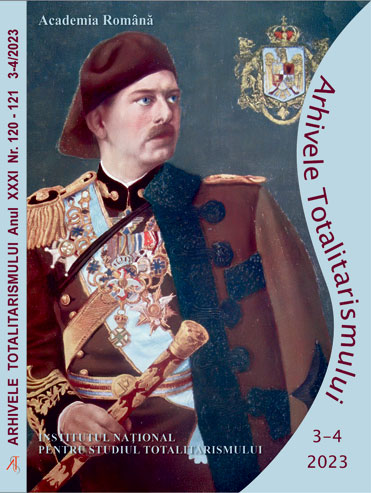
After the proclamation of the Romanian People’s Republic in December 1947, a new direction in art developed. The Flacăra exhibition marks the beginning of Soviet-style socialist realism, which gradually takes hold of the Romanian art scene. The press played an essential role in the establishment of realism and exercised a particular form of control. The Communist Party realised that art and the press could be a powerful tool to convey the Marxist-Leninist ideology. The article analyses the press discourse on the works presented in Flacăra.
More...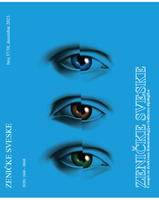
U Filozofiji historije Hegel daje divan opis Tukididove knjige o peloponeskom ratu: "njegovo besmrtno djelo je apsolutna korist za čovječanstvo proistekla iz tog konteksta."1 Ovaj bi sud trebalo protumačiti u svoj njegovoj naivnosti: na način da se, sa stajališta historije svijeta, peleponeski rat dogodio zato da bi Tukidid mogao o njemu napisati knjigu. Šta ako nešto slično vrijedi i za odnos između ekplozije modernizma i prvog svjetskog rata, ali u suprotnom smjeru? Veliki rat nije bio traumatski lom koji je poremetio naprednjaštvo 19-og stoljeća, nego reakcija na istinsku prijetnju uspostavljenom poretku: eksploziju avangardne umjetnosti, znanosti i politike koja potkopava uspostavljeni svjetonazor (umjetnički modernizam u književnosti – od Kafke do Joyce-a - , u muzici - Schoenberg i Stravinsky -, u slikarstvu - Picasso, Malevitch, Kandinsky -, psihoanaliza, teorija relativiteta i kvantna fizika, uspon socijaldemokratije...) To naprsnuće – najjače u 1913., annus mirabilis umjetničke avangarde – do te mjere razorno pri otvaranju novih prostora da bi spekulativna historiografija čak mogla doći u iskušenje- ustvrditi da je, s "duhovne" tačke gledišta, veliki rat iz 1914. izbio kao reakcija na taj Događaj prsnuća – ili, da parafraziram Hegela, užasi prvog svjetskog rata su cijena koju je čovječanstvo moralo platiti zbog pokretanja besmrtne umjetničke revolucije u godinama netom prije rata. Drugim riječima, mora se preokrenuti pseudo-duboki uvid o tome kako su Schoenberg et al predskazali užase rata u XX. vijeku: šta ako je 1913-ta taj pravi Događaj? Ključno je usredsrediti se na taj prijelazni eksplozivni trenutak između samodopadnosti kasnog 19. stoljeća i katastrofe prvog svjetskog rata – 1914. nije predstavljala buđenje iz sna, nego snažan i nasilan povratak patriotskog sna predestiniranog da spriječi istinsko buđenje. Činjenica da su fašisti i ostali patrioti mrzili avangardnu entartete Kunst nije tek marginalni detalj, nego ključna značajka fašizma. S takve pozadine trebamo pristupiti odnosu između moderne umjetnosti i užasa historije XX. stoljeća.
More...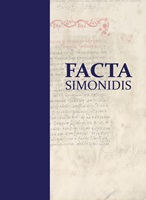
A Report on the National Scientific Conference Aktion Zamość 1942-1943, Academy of Zamość, Zamość, 28 February 202
More...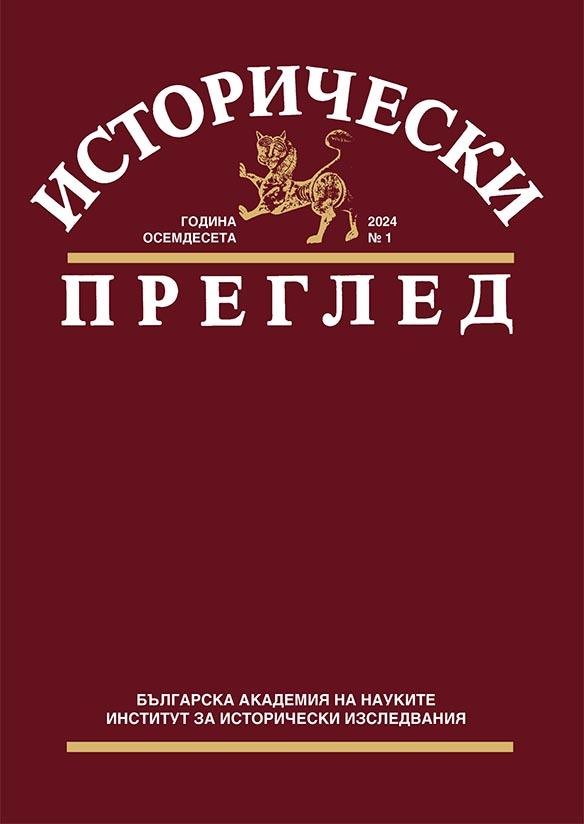
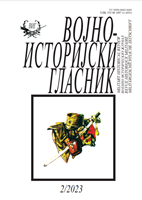
I n the 1930s, the European continent was dominated by the fear of a new war, so almost all countries began to pay special attention to war preparations. In this context, great attention was paid to youth and their physical and military training. The Kingdom of Yugoslavia, faced with many recruits unfit for military service, joined the European trend by introducing compulsory physical education into the social life of students and out-ofschool youth. This wording concealed the true nature of the new institution, namely pre-military education. Although the legislative solution was ideal in theory, in practice it had several weaknesses that did not allow the development of compulsory physical education. The legislature overlooked several important issues. First, there was a lack of trained teachers to teach the inmates. In addition, the law placed an excessive burn on the municipalities, which were unable to solve all the problems of organizing compulsory physical education, especially the material ones, since they were responsible for providing space and compensating teachers. The army also did not do everything in its power to provide the best possible support for pre-military training especially since the question of equipping the courses with weapons was not settled until before the April War began. Finally, the young people looked for ways to avoid the new obligation, so that less than half of the obligated participated the holiday courses. For this reason, the work results achieved were also not satisfactory
More...